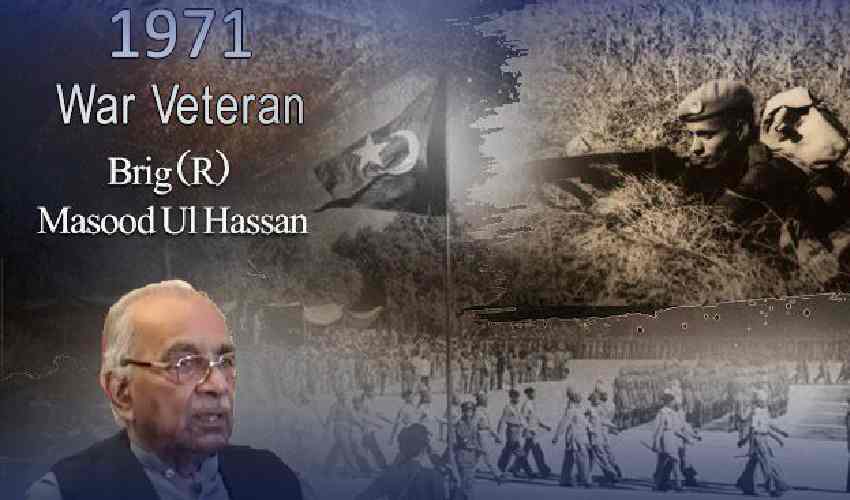In 1971, Pakistani soldiers displayed exceptional courage and valor during the conflict, sacrificing their lives for the defense of their homeland.
Brigadier Retired Masoodul Hasan, a participant in the conflict, sheds light on the complexities of that time. His insights challenge the prevailing narrative that implicates the Pakistan Army in atrocities against Biharis in East Pakistan.
Recalling his first posting in East Pakistan, Brigadier Hasan emphasizes the tense atmosphere and the alleged propaganda by India to tarnish the image of the Pakistan Army. He contends that the Biharis, who were supportive of Pakistan, were not subjected to oppression by the Pakistani forces. He dismisses claims of human rights violations, asserting that India propagated false allegations against Pakistan to discredit its military.
Brigadier Hasan addresses the discrepancy between the alleged persecution of Biharis and the absence of concrete evidence supporting such claims. He highlights that the number of Pakistan Army personnel in East Pakistan was limited, making it implausible for them to orchestrate widespread atrocities. According to him, any violence against the Biharis would have been exposed, but the lack of evidence suggests it was a fabricated narrative by India.
Refuting accusations against the Pakistan Army, Brigadier Hasan clarifies that during the war, there were only two brigades in Comilla and Jessore, with minimal personnel. He disputes the notion that Pakistan Army was responsible for the reported killings, asserting that non-Biharis were targeted by the Indian Army and the Mukti Bahini, a group alleged to have committed acts of violence and blamed it on the Pakistan Army.
In essence, Brigadier Retired Masoodul Hasan's account challenges the prevailing narrative surrounding the 1971 war, suggesting that the accusations against the Pakistan Army may have been part of a larger propaganda effort by India.
Valorous tale of Second Lieutenant Salar Baig
The valorous tale of Second Lieutenant Salar Baig, hailing from Hunza, emerges as a beacon of courage and sacrifice. Engaging in fierce combat against the Indian army in Jessore from the war's onset on November 21 to its 25th day, Lt. Salar Baig's unwavering determination and bravery left an indelible mark on the battlefield.
As the troop leader, Lt. Salar Baig's tank bore the brunt of enemy fire, resulting in a serious eye injury. Undeterred by this setback, the resilient young officer chose to press on, steadfastly holding his position. The battle of Jessore exacted a heavy toll, claiming the lives of 22 soldiers from the Independent Armored Squadron of the Pakistan Army. Yet, even in the face of considerable losses, the squadron's morale remained unbroken.
Despite being injured, Lt. Salar Baig refused evacuation and continued to fulfill his wartime duties, commanding two tanks under his charge. In a pivotal moment on December 15, facing an onslaught from two Indian companies with T-55 tanks, Lt. Salar Baig displayed extraordinary courage. Utilizing his last available rounds, he struck one of the enemy's T-55 tanks, prompting the retreat of the remaining enemy tanks. Lt. Salar Baig's steadfastness not only thwarted the enemy's advances but inflicted heavy damage on their forces.
However, the relentless nature of warfare eventually caught up with Lt. Salar Baig. Targeted by the long-range tanks of the Indian army, he valiantly held his ground until the end. His sacrifice became a symbol of resilience, causing significant casualties and financial losses for the adversary. Lt. Salar Baig's bravery, enduring for 25 days on the battlefield, stands as a testament to the courage that lights the way for future generations.
Havaldar Muhammad Younis Khan
Havaldar Muhammad Younis Khan recalled receiving orders to join the war, and despite the Indian army's advancement, Pakistani forces successfully protected the Bihari area and thwarted potential damage to Makin.
The true warriors, the mujahideen, fought relentlessly on the front lines, with Lance Naik Mohammad Gulzar Khan highlighting their high spirits and determination.
During the war, Lance Naik Mohammad Gulzar Khan's unit destroyed three Indian tanks and gained control of approximately 16 kilometers of territory.
The soldiers' unwavering commitment was evident as they faced the enemy without concern for their lives or possessions. Naik Anwar Ahmad Khan shared how the Pakistani forces, with strategic firing, demoralized the enemy, causing significant casualties and financial losses.

Subedar Khalid expressed gratitude to God for the successful capture of enemy territory with minimal damage. Naib Risaldar Khalil Ahmad emphasized the psychological impact of chanting "Allahu Akbar," inflicting heavy losses on the enemy.
Flight Sergeant Abdul Qayyum spoke of the bravery exhibited by the Pakistani forces, asserting their readiness to confront any adversary. Every soldier in the Pakistan Army carries the profound sense of duty, willing to sacrifice their lives for the country.



























